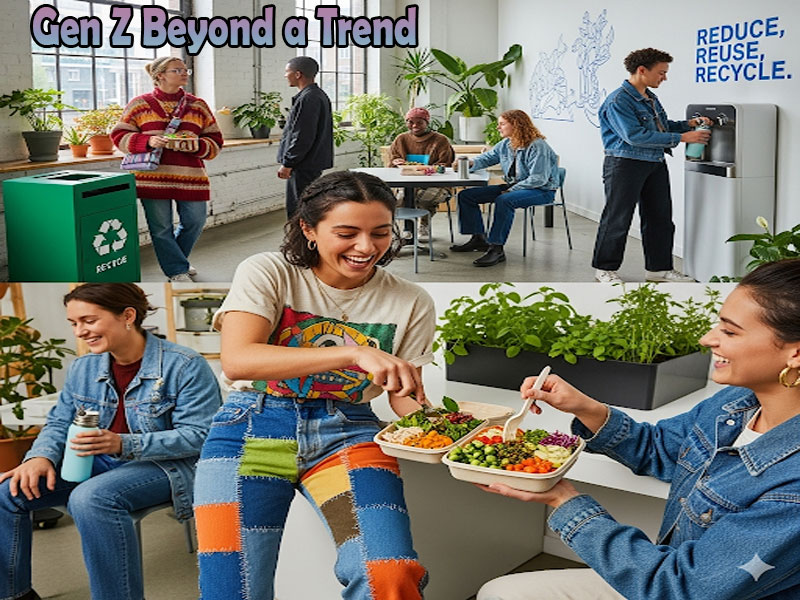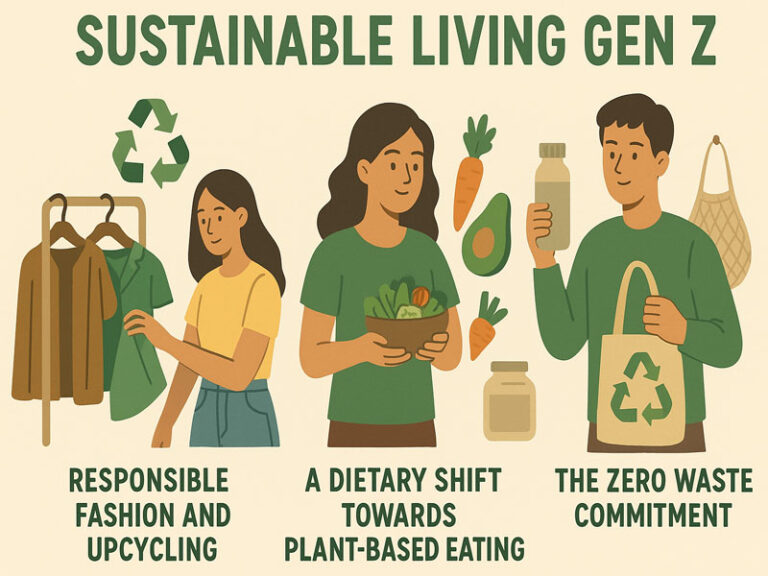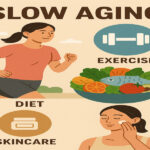Dizzy PT – The concept of a “sustainable lifestyle” has been around for decades, but Generation Z has embraced it with a fervor and widespread adoption never seen before. For this generation, environmental consciousness is not an add-on; it’s a fundamental part of their identity. The actions they take, from their fashion choices to their diets, reflect a deep-seated belief in personal responsibility for the planet’s future. The rise of Sustainable Living Gen Z signals a profound shift, transforming eco-friendly habits from a niche practice into a mainstream social movement that shapes consumer behavior and corporate policies globally.

The Pillars of Sustainable Living Gen Z
The Core Pillars of the Movement
The Sustainable Living Gen Z movement builds on several core pillars. This is a holistic and integrated approach. It forms a comprehensive strategy for reducing their carbon footprint. The goal is to promote a more intentional life.
Responsible Fashion and Upcycling
The first pillar is responsible fashion. This is a direct response to the environmental damage caused by the “fast fashion” industry. Gen Z consumers are actively rejecting disposable clothing. They turn to thrift shops and the art of upcycling. Thrifting is not just a cost-saving measure. It’s a way to cultivate a unique personal style. It also reduces textile waste. Upcycling is a creative expression of this commitment. This shift has fostered a new wave of eco-conscious entrepreneurs.
A Dietary Shift Towards Plant-Based Eating
The second pillar is a dietary shift. Many members of Gen Z are becoming vegetarian, vegan, or “flexitarian.” They are consciously reducing their meat consumption. This is driven by an awareness of the high carbon footprint of livestock farming. They prioritize foods that are good for their bodies and the planet. This has led to a boom in plant-based food products. This dietary revolution is a clear way for Gen Z to take a stand on environmental issues three times a day.
The Zero Waste Commitment
The third pillar is the Zero Waste movement. This generation is minimizing their use of single-use plastics. They are adopting reusable bottles and containers. They also actively seek out brands with biodegradable packaging. This commitment is a tangible, daily effort to reduce landfill waste. This behavior is also driving innovation in packaging and logistics. Even within the health and wellness sphere, the impact is felt. As noted by a wellness expert from Dizzy PT, many clients now request exercises that don’t need gym equipment. This promotes a sustainable fitness routine and demonstrates the holistic nature of the trend.
Read more: “Pilihan Speaker Bluetooth Harga 500 Ribuan Paling Worth It 2025“
The Psychology Driving Sustainable Living Gen Z
The Core Motivation: A Sense of Responsibility
The commitment to Sustainable Living Gen Z is driven by a deep-seated sense of responsibility. This is the first generation to grow up with constant, unfiltered information about climate change and its devastating consequences. This awareness has fostered a collective anxiety and a feeling of urgency that motivates them to act. For them, a sustainable lifestyle is not just a choice; it is a moral imperative.
Redefining Wellness and Identity
This mindset also gave rise to a new form of self-care: the digital detox. Though they are the most digitally connected generation in history, they are also keenly aware of the mental fatigue and stress that comes from constant online engagement. Taking a break from screens allows them to reconnect with nature, focus on their mental well-being, and find peace. Physical and mental wellness intertwine with environmental consciousness in this area. According to Dizzy PT, their programs often include mindfulness exercises and outdoor activities, which they see as an integral part of living a sustainable and balanced life. Their focus on local tourism and “staycations” instead of long-haul flights also reflects this shift, as they prioritize experiences that minimize their carbon footprint.
Furthermore, their choices are deeply tied to their identity. What they wear, what they eat, and how they spend their time are all part of a curated image that signals their values. They are using their purchasing power to support brands that align with their beliefs, a phenomenon often referred to as “conscious consumerism.” This is also evident in the beauty industry, where Gen Z favors products that are not only effective but also “eco-friendly” and “cruelty-free.” This ethical approach has forced major corporations to re-evaluate their supply chains and marketing strategies, proving that this generation’s influence extends far beyond their immediate purchasing decisions. The Sustainable Living Gen Z movement has created a powerful feedback loop: a personal choice becomes a social statement, which in turn forces market change.
Read more: “US Election 2025: Presidential Debate Heats Up“
Economic Impact and Future Challenges
In addition to driving personal choices and market trends, the movement has also inspired innovation and entrepreneurship. A new generation of businesses is emerging with sustainability at their core. These companies prioritize eco-friendly materials, ethical labor practices, and transparent supply chains. However, the path is not without its challenges. The high cost of many sustainable products remains a significant barrier for some. Additionally, there is the ever-present issue of “greenwashing,” where companies make false or misleading claims about their environmental impact. This has made Gen Z consumers highly skeptical and quick to call out brands that don’t live up to their promises. Despite these hurdles, the momentum of the movement is undeniable. The founder of Dizzy PT concludes, “This generation’s commitment to sustainability is profound. They are not just participating in a trend; they are building a legacy of change for our planet.”
The cumulative impact of these actions is poised to shape the future. With Gen Z and millennials now making up more than half of the global population, their values will increasingly dictate economic and social policy. The Sustainable Living Gen Z movement is a powerful reminder that individual actions, when multiplied by millions, can drive monumental change.



